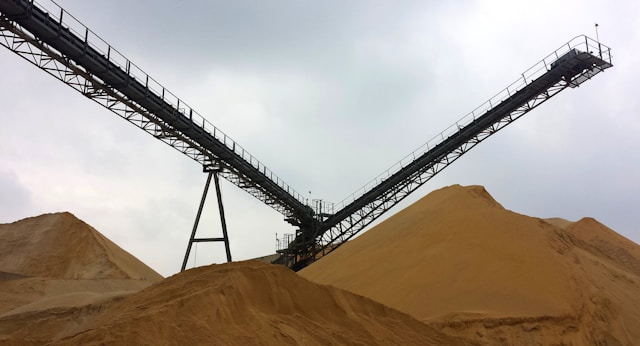Editor’s note: Indonesia lifts its ban on sea sand exports
More than 250 members of Indigenous and local communities gathered in Indonesia’s Merauke district to demand an end to government-backed projects of strategic national importance, or PSN, which they say have displaced them, fueled violence, and stripped them of their rights. PSN projects, including food estates, plantations and industrial developments, have triggered land conflicts affecting 103,000 families and 1 million hectares (2.5 million acres) of land, with Indigenous communities reporting forced evictions, violence and deforestation, particularly in the Papua region. In Merauke itself, the government plans to clear 3 million hectares (7.4 million acres) for rice and sugarcane plantations, despite Indigenous protests; some community members, like Vincen Kwipalo, face threats and violence for refusing to sell their ancestral land, as clan divisions deepen. Officials have offered no concrete solutions, with a senior government researcher warning that continued PSN expansion in Papua could escalate socioecological conflicts, further fueling resentment toward Jakarta and potentially leading to large-scale unrest.
By Wahyu Chandra / Mongabay
Hundreds of protesters, including young and Indigenous peoples from three coastal villages, have demanded the closure of sand dredging in Indonesia’s West Sulawesi over environmental concerns and permit violations.
The protest earlier this month marked the latest in a series of demonstrations by residents of Karossa, Pasangkayu and Kalukku, who have voiced opposition to sand mining in Mamuju and Central Mamuju districts since November 2024. Tensions escalated after the West Sulawesi provincial investment office issued a mining business permit in March 2024 to PT Alam Sumber Rezeki (ASR), which plans to operate at the mouth of the Benggaulu River in Karossa.
The May 5 rally at the West Sulawesi governor’s office was sparked by a public statement from Governor Suhardi Duka, who dismissed the opposition as “thuggery” and insisted the mining permit had been issued in accordance with the law.
“That statement shows that our leaders still greatly lack a sense of solidarity with the people and the ability to understand what we are going through,” said Taufik Rama Wijaya, youth coordinator at the Indigenous Peoples Alliance of the Archipelago (AMAN) in West Sulawesi.
For nearly three hours of the protest, no government official came to address the crowd. It was reported that the governor and his team were on their way to Jakarta — some 2,000 kilometers (1,240 miles) to the west from his office. Frustrated, the protesters attempted to force their way into the governor’s office, sparking a clash with security forces. Several demonstrators were drenched by water cannons during the confrontation.
“So why is it so difficult for us to simply meet the governor and directly express our concerns?” said Zulkarnain, a coordinator of the Alliance of West Sulawesi People Against Mining.
PT Alam Sumber Rezeki holds a 69.9-hectare (173-acre) mining concession, according to Minerba One Map Indonesia (MoMI), an area that largely overlaps with community-owned land and fishponds. An investigation by the Alliance of West Sulawesi People Against Mining into the company’s feasibility study indicates that sand extracted from the river will be transported to North Penajam Paser district in East Kalimantan to support the construction of Indonesia’s new capital, Nusantara.
Many environmentalists have warned of the extensive footprint of environmental degradation brought on by the development of the city’s core and supporting infrastructure — not just in the interior of East Kalimantan, but across the island and beyond.
“The presence of sand and rock mining operations in several parts of West Sulawesi meant to supply materials for the new capital (IKN) or for sand exports poses a serious threat to communities living near the extraction sites,” the group said. “This is currently being experienced by residents in Mamuju and Central Mamuju.”
The protest in West Sulawesi is part of a long-running resistance. Residents had previously organized demonstrations at the village, subdistrict and regency levels and repeatedly participated in public hearings with the West Sulawesi provincial legislature and the mining company.
Yet, the government pushed ahead with the permit while public opposition was still mounting. The decision has not only intensified tensions between the community and the company but also led to criminalization of at least 21 residents (18 from Central Mamuju and three from West Kalukku) reported to the West Sulawesi police for rejecting the mining operation.
“Community involvement in issuing permits must not be merely a formality because they are the ones most affected by the mining,” AMAN’s Rama said.
Rama and his group demanded the closure of harmful mining operations in areas such as Karossa, Kalukku and Pasangkayu while also condemning the West Sulawesi governor’s remark equating anti-mining protests with thuggery and calling for a public apology. They also denounced police repression of peaceful demonstrators, urged the release of three detained protesters and called for an end to all environmentally destructive mining activities.
“The Indigenous youth and communities will not remain silent. We will continue to speak the truth and stand with the people,” Rama said.
Photo by Jandira Sonnendeck on Unsplash
